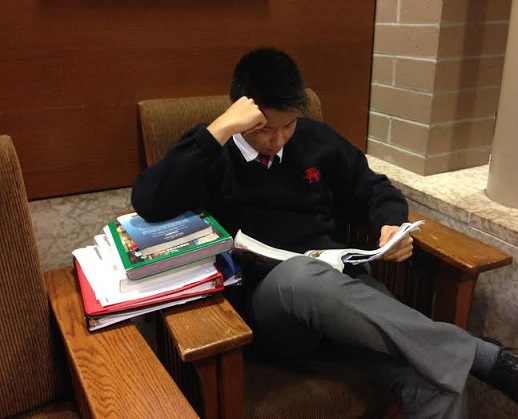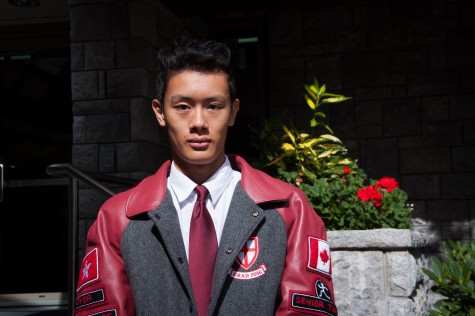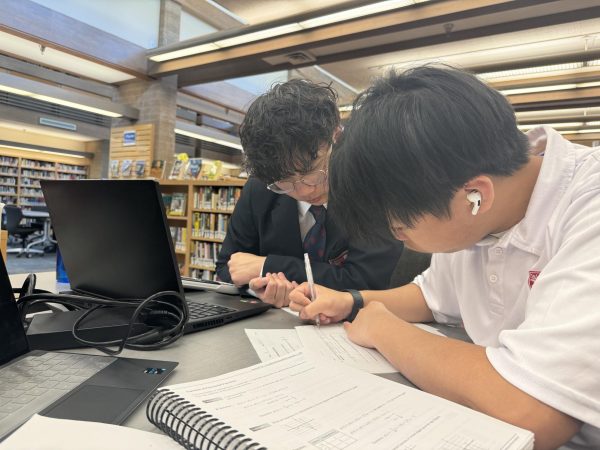Student Stress at St. George’s

George Lin, Grade 11, studies diligently for upcoming tests and assignments in the midst of his most challenging year yet.
At St. George’s, every boy strives for excellence in all areas of the school: academics, athletics and co-curricular activities. It is this commitment, exemplified by the student body each day, that establishes St. George’s as a truly unique school, a school that lives up to its motto of “Building Fine Young Men”. With so much that the boys have to keep in mind while representing not only the school but themselves to the best of their ability, there are many challenges that they encounter. One of the most difficult challenges that has to be coped with is day-to-day stress. But what exactly is stress and how does it continue to affect us?
According to the Canadian Mental Health Association, stress is “the body’s response to a real or perceived threat meant to get people ready for some kind of action to get them out of danger”. However nowadays, especially in school, the threats that we most frequently face cannot just be avoided; rather, we have to progress through them as they arise. With eight courses (mostly academic), a mandatory games option, clubs of all sorts and any extra-curricular activities, it is apparent why boys from the school have stress and a hard time dealing with it.
In St. George’s, stress seems to increase substantially from one grade to the next as the expectations and workload increases simultaneously. As a result, stress seems to accumulate more with the boys in the senior grades as the next step of their educations and lives approaches. Below are some quotes from boys of different grades, describing their views on stress in their respective years:
“Frankly speaking, being in Grade 10 gave me a feeling that I had never felt before in the senior school, or in my life. Aside from more homework stress, I felt as if the responsibilities of being a grown man, the responsibilities that come with age and maturation, were slowly starting to become expected of me. Though Grade 10 academic life has became much more heavy with school work, I now also feel more burdened with being a mature, sensible person.”
-Jason Qu, Grade 10
“I found myself going into full swing at the very first week of Grade 11. I think that this year is my important one at Saints because I need to work hard in order to fulfill requirements for the school I want to apply to. With that said, the workload is building up a significant amount of stress with the addition of preparing for tests such as the SAT and UKCAT. I feel that I am having less time for extra-curriculars because I am studying for different tests every day.”
-Matthew Leung, Grade 11
“Last year, I was still able to socialize with friends and occasionally go out, despite the workload. However with the looming deadline for early applications and the immense pressure of keeping grades high and refining all of our application essays, the amount there is to do has made me lose touch with many of my peers. From a health perspective, it’s not uncommon for a many of us to be getting 3-5 hours of sleep every night in order to keep on top of everything. I would say that this year is definitely the apex of stress in high school.”
-Kelvin Zhu, Grade 12
Each of these students have slightly different experiences with stress thus far, but they all have a common perspective: stress is unavoidable and comes as a natural consequence when attending a school such as St. George’s. However, it does not mean that stress cannot be dealt with.
When feeling stressed out, students should always remember that it is acceptable to give themselves breaks as a way to prevent being overwhelmed. Although it is tempting to have marathon study sessions through the night, students have to know when their brains are in need of rest; not having enough rest can not only be harmful to the body, but also hinder performances in all academics. Students should also seek their personal counselors, teachers, family and friends so that they can receive help and support when handling stress. There are many other ways to reduce stress such as staying physically active, keeping strong relationships with friends or even meditating for relaxation. Every student should find the way that works for him so that whenever stress arises, he is equipped to work through it and move on.

Kenneth Ng is currently a Grade 12 student at St.George's School. Since joining Saints in Grade 8, he has been involved in many areas of the school such...











